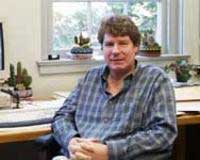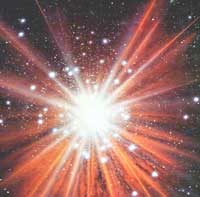The universe has given us a unique Theater
According to Mark Whittle, professor of astronomy at Virginia University, the Big Bang big bang 13.7 billion years ago caused a tremendous noise, releasing billions of stars and galaxies. Whittle has built a sound clip at the birth of the universe, and obviously doesn't sound like an explosion at all.

Mark Whittle
Whittle describes: The noise sounded like "the shrieking low, becoming a deep, intense roar, and ending with a shrill whisper." To identify the sound of creation, he applied the latest advances in astronomy, sophisticated computer programs, and some basic musical concepts.
Whittle, who specializes in the study of galaxy formation, put his "cosmic sound" to the American Astronomical Society in Denver. He explained: This sound existed during the first 380,000 years of the universe. At that time, a flashy, hot, flashy fog created a thin layer of cosmic atmosphere capable of conducting sound waves. Whittle said: "The universe is expanding, so it was much smaller in the old days, and all the material that we now see on planets and galaxies has been spread uniformly to create thin layer of gas In this atmosphere, sound waves can be created, developed and moved ".
"Decoding" cosmic genes "
In 1963, two researchers Arno Penzias and Robert Wilson of Bell Laboratories (USA) discovered a pale wave of waves spreading throughout the sky. This cosmic microwave background radiation is a bit of Big Bang's ancient remnants.
 Because microwaves are out of sight of the human eye, scientists need a special telescope to be able to analyze it. In 2001, NASA introduced one of the most sophisticated microwave imaging devices, the Wilkinson anisotropic microwave probe (WMAP). In 2003, satellites and satellite science groups successfully built the most detailed microwave map of space ever. The map provides the most detailed fluctuations in the brightness of this background radiation, which Whittle calls image "bacteria on a bowling ball . " These fluctuations show that the peaks and bottoms of sound waves move through the hot air of the nascent universe. Whittle said: "We actually saw sound waves. There are small waves at the top of the big wave, all together creating a patchy image."
Because microwaves are out of sight of the human eye, scientists need a special telescope to be able to analyze it. In 2001, NASA introduced one of the most sophisticated microwave imaging devices, the Wilkinson anisotropic microwave probe (WMAP). In 2003, satellites and satellite science groups successfully built the most detailed microwave map of space ever. The map provides the most detailed fluctuations in the brightness of this background radiation, which Whittle calls image "bacteria on a bowling ball . " These fluctuations show that the peaks and bottoms of sound waves move through the hot air of the nascent universe. Whittle said: "We actually saw sound waves. There are small waves at the top of the big wave, all together creating a patchy image."
The WMAP team used computer programs to find the ratio of wave size to the sound spectrum, just like when the prism changes the wavelength to color. On that basis, Whittle was able to convert relative numbers and wave forces of different sizes into relative sounds with different high and low notes. This universal sound spreads about ten octaves. The first five octaves correspond to sound waves - the original sound of the universe, which existed for about 380,000 years.
Whittle said: The age of the young universe is equivalent to human life within 12 hours of being aware, and he likens these sound waves to . cosmic DNA. Whittle believes that his soundtrack can help discover the process of material dispersal during the period of cosmic formation. In some ways, research on ancient sound waves can be compared with a project to decode the cosmic gene. DNA is crucial to human development, and sound waves determine the development of planets and galaxies in the early universe.
From screams to whispers
 According to Ted Bunn, associate professor of physics at Richmond University (Virginia), Whittle's work meaning is to confirm the turmoil in the universe in the early days is the sound wave. Astronomers all know this, but "pagan" researchers are very few. "The physical structure for the first 500,000 years of the universe is often considered to be very abstract and confusing. So Whittle's work provides an interesting research method," Bunn said .
According to Ted Bunn, associate professor of physics at Richmond University (Virginia), Whittle's work meaning is to confirm the turmoil in the universe in the early days is the sound wave. Astronomers all know this, but "pagan" researchers are very few. "The physical structure for the first 500,000 years of the universe is often considered to be very abstract and confusing. So Whittle's work provides an interesting research method," Bunn said .
The irony is that the original Big Bang was completely . quiet. Later, sound began to form and develop. Whittle's work shows that the universe's "concert" sound grew until it reached 110 decibels, equivalent to a rock . concert. Large sound waves (about 20,000 light years long) and low (about five octaves below hearing), to the point where Whittle must adjust to fit the hearing of the human ear. Sounds like the sound of a jet engine dropping in . television, Whittle's audio track has compressed the universe's millions of years of sound into a 5-second beat.
Whittle said: "The universe has given us a unique" theater ", though not perfect, to" perform "the opening sound of creation, listening to the sound of the universe, you can imagine For example, if, due to the basic pitch, you can measure the density of the universe. "
- A tour of the world's most beautiful cinemas
- Discovering a huge ancient Roman theater in England
- Discovering a Roman theater with a capacity of 15,000 people
- Opéra Theater, Paris
- The gold coin jar buried more than 1,500 years under the Italian theater
- Admire the theater masterpiece of the ancient Greeks
- The buildings have unique architecture in Copenhagen
- The secret of the magic transmission ability of the Greek theater
- Ancient theater from Roman times was discovered in Volterra, Italy
- Everyone has a unique 'universe' that revolves around him, like a fingerprint
- Lenovo's latest laptop multimedia model
- Discover unique natural phenomena
 Van Allen's belt and evidence that the Apollo 11 mission to the Moon was myth
Van Allen's belt and evidence that the Apollo 11 mission to the Moon was myth The levels of civilization in the universe (Kardashev scale)
The levels of civilization in the universe (Kardashev scale) Today Mars, the sun and the Earth are aligned
Today Mars, the sun and the Earth are aligned The Amazon owner announced a secret plan to build a space base for thousands of people
The Amazon owner announced a secret plan to build a space base for thousands of people